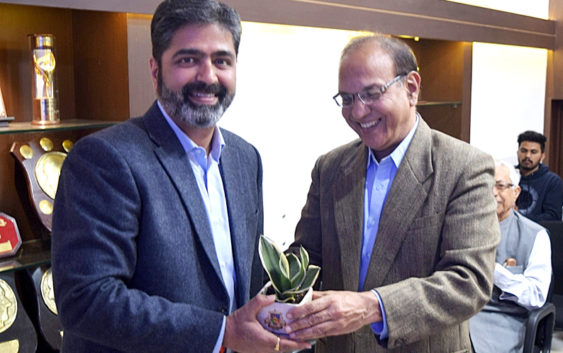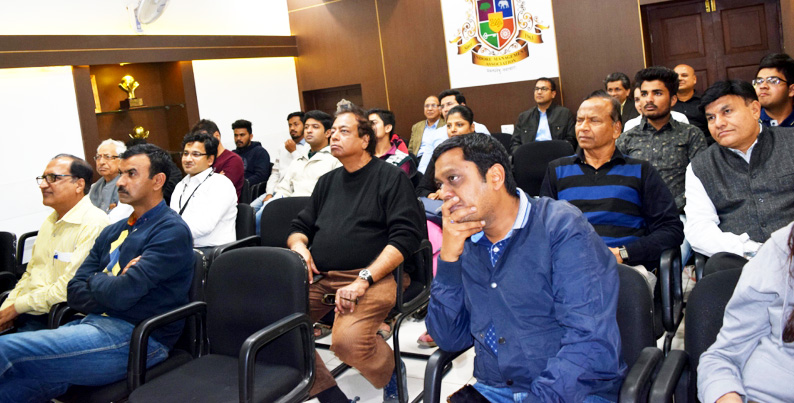- मणिपाल हॉस्पिटल्स ने पूर्वी भारत का पहला एआई-संचालित इंजेक्टेबल वायरलेस पेसमेकर सफलतापूर्वक स्थापित किया
- Manipal Hospitals successfully performs Eastern India’s first AI-powered injectable wireless pacemaker insertion
- Woxsen University Becomes India’s First Institution to Achieve FIFA Quality Pro Certification for RACE Football Field
- यूनियन बैंक ऑफ इंडिया ने यू – जीनियस राष्ट्रीय प्रश्नोत्तरी फिनाले में प्रतिभाशाली युवाओं का किया सम्मान
- Union Bank of India Celebrates Bright Young Minds at U-Genius National Quiz Finale
Mentoring from CEO’s On Changing Chinese Economy, Opportunities and lessons for India

Indore Management Association organized Mentoring from CEO’s session on the topic “Changing Chinese Economy, Opportunities and lessons for India”on Wednesday, Jan 29, 2020at IMA Meeting Room, Jall Auditorium, Indore.The Facilitator for the session was Mr. Pradhyumna Ingle.
Pradhyumna Ingle is Regional Business Head, Asia Pacific for the General Manufacturing & Maintenance and Consumer & Construction adhesives businesses for Henkel KgaA.
Pradhyumna joined Henkel in India in 2001 and has led the Asia Pacific Marketing & Business Development Organization for Henkel’s Adhesive Technologies business in addition to assuming various other strategic roles in India and China.
This is his second stint in China having spent 6 years there from 2007 – 2013. Pradhyumna holds a Bachelor’s degree in Engineering from Government Engineering College, Ujjain, India and a Masters in Marketing Management from the Institute of Management Studies, Indore, India.
He started the session by explaining how China makes an oversized impact in the world economy. It contributes to 15% of world GDP and 30% of the world’s GDP growth.
The Chinese growth model has made the country the largest and fastest growing economy in the human history – lifting 700 million people to middle class affluence and create the factory of the world. Chinese companies are increasingly taking global stage with 5 out of 10 largest global companies in the Forbes’ Global 2000 list being from China.

Mr. Ingle highlighted one of the most striking characteristics of the economic development model in China for him was “special industrial clusters”.
These clusters typically focus on and specialize in one industry -sometimes even one product – and build an entire ecosystem of suppliers, workers, channels and innovation around it. This enables rich competition and talent development cycle driving costs down and performance improvements.
Another key feature for him was strong government support to the local industry. The government identifies and supports key strategic segments right from funding R&D, to getting preferential approvals, financing and tax benefits, This helps new industries and companies especially in their nascent phase. Many leading high tech companies from China are fully supported by the government in their early phase.
He also highlighted that howChinese economy is changing in recent years. The government is focused on moving the manufacturing industry higher up the value chain, become a high technology superpower and manage environmental impact.
The recent US China trade war has created a new dynamic for the global economy. The key opportunities for Chinese economy according to Mr. Ingle are: Shifting from an investment led economy to a consumption driven economy, increasing investments in digital economy and moving from imitation to innovation.
China has made rapid strides in digitizing its economy and accounts for 40% of global e-commerce. The mobile payments in China are now over 800 billion USD per year – more than 11 times that in the U.S. China accounts for almost half of the global investments in Artificial Intelligence (AI).
China has also laid out a clear roadmap for its core manufacturing segment with “Made in China” initiative 2025 with transparent target towards moving to global leadership position in identified industries.
India has many similarities and more differences in economic and industrial structure, governance models and opportunities, Mr. Ingle highlighted. We can learn many lessons from the systematic industrial development of China: how to develop an industrial ecosystem, how to increase predictability for industry and entrepreneurs and how to plan ahead, he said.
Indian industry can participate in the Chinese growth in many ways and at the same time, benefit from advancing and maturing Chinese economy. The opportunities exist from sourcing to attracting FDI and from pharma to promoting tourism. Mr. Ingle expressed confidence that India has tremendous opportunity and potential to be a 5 trillion dollar economy in the short term and we are headed in the right direction.


